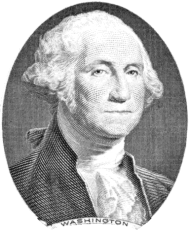 Excerpts from Joseph J. Ellis's book, His Excellency: George Washington, tell us much about Washington's character and the origins of US policy toward Indians.
Excerpts from Joseph J. Ellis's book, His Excellency: George Washington, tell us much about Washington's character and the origins of US policy toward Indians. Excerpts from Joseph J. Ellis's book, His Excellency: George Washington, tell us much about Washington's character and the origins of US policy toward Indians.
Excerpts from Joseph J. Ellis's book, His Excellency: George Washington, tell us much about Washington's character and the origins of US policy toward Indians.
Washington's first meeting with Indians as the British negotiated with the French over the Ohio territory:
[T]he person whom Washington quotes more than any other in his Journal represented yet a third imperial power with its own exclusive claim of sovereignty over the Ohio Country. That was the Half-King, the Seneca chief whose Indian name was Tanacharison. In addition to being a local tribal leader, the Half-King had received his quasi-regal English name because he was the diplomatic representative of the Iroquois Confederation, also called the Six Nations, with its headquarters in Onondaga, New York. When they had first met at the Indian village called Logstown, Tanacharison had declared that Washington's Indian name was Conotocarius, which meant "town taker" or "devourer of villages," because this was the name originally given to Washington's great-grandfather, John Washington, nearly a century earlier. The persistence of that memory in Indian oral history was a dramatic reminder of the long-standing domination of the Iroquois Confederation over the region. They had planted no lead plates, knew nothing of some English king's presumptive claims to own a continent. But they had been ruling over this land for about three hundred years.
In the present circumstance, Tanacharison regarded the French as a greater threat to Indian sovereignty. "If you had come in a peaceable Manner like our Brethren the English," he told the French commander at Presque Isle, "We shou'd not have been against your trading with us as they do, but to come, Fathers, & build great houses upon our Land, & to take it by Force, is what we cannot submit to." On the other hand, Tanacharison also made it clear that all Indian alliances with European powers and their colonial kinfolk were temporary expediencies: "Both you & the English are White. We live in a Country between, therefore the Land does not belong either to one or the other; but the GREAT BEING above allow'd it to be a Place of Residence for us."
Washington dutifully recorded Tanacharison's words, fully aware that they exposed the competing, indeed contradictory, imperatives that defined his diplomatic mission into the American wilderness. For on the one hand he represented a British ministry and a colonial government that fully intended to occupy the Ohio Country with Anglo-American settlers whose presence was ultimately incompatible with the Indian version of divine providence. But on the other hand, given the sheer size of the Indian population in the region, plus their indisputable mastery of the kind of forest-fighting tactics demanded by wilderness conditions, the balance of power in the looming conflict between France and England for European domination of the American interior belonged to the very people whom Washington's superiors intended to displace.
More on Washington and Indians
Celebrating Presidents' Day
Related links
Fun 4th of July facts
|
. . . |

|
All material © copyright its original owners, except where noted.
Original text and pictures © copyright 2007 by Robert Schmidt.
Copyrighted material is posted under the Fair Use provision of the Copyright Act,
which allows copying for nonprofit educational uses including criticism and commentary.
Comments sent to the publisher become the property of Blue Corn Comics
and may be used in other postings without permission.